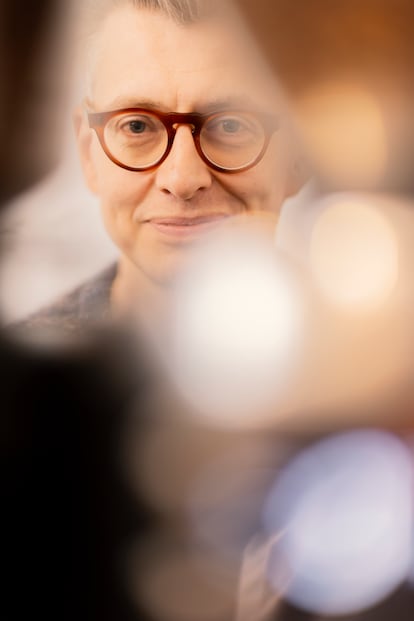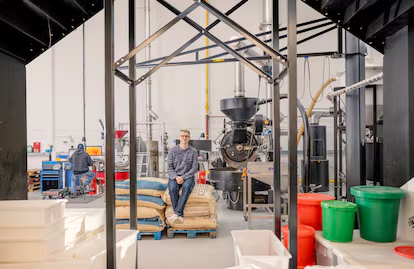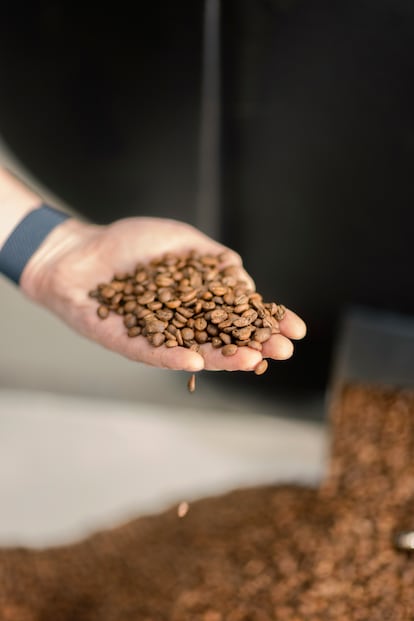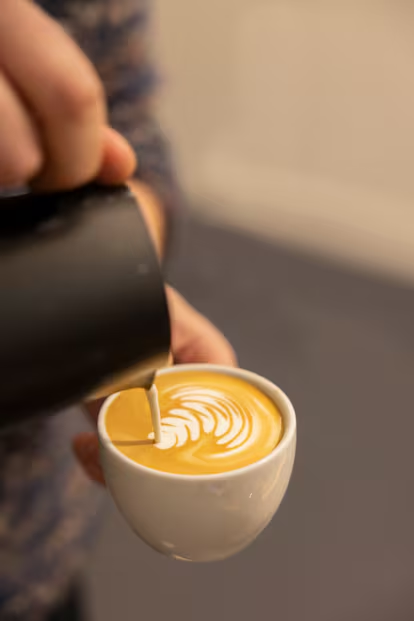James Hoffmann, the coffee guru: ‘At home you can drink one of the best in the world for about 40 cents a cup’
The Englishman, who sparked the trend of specialty coffee 20 years ago, today runs an empire that includes books, consulting, collaborations and more

The first time James Hoffmann tried coffee, he was four years old and he spit it onto his mother’s cream-colored carpet. It was “the most disgusting thing I had ever had,” he recalls. Who would have known that that boy who grew up in the Lake District, in the northwest of England, would become the world barista champion at 28 and, later, a sort of Steve Jobs of coffee, the star of specialized festivals, who has a manager and whose YouTube videos on how to make filter coffee or latte at home have garnered more than four million views.
“I became obsessed. I think that’s the right word,” he says with a half-smile, sitting in an office of his London roasting company, Square Mile Coffee Roasters, the first to import specialty coffee — an Arabica variety that has obtained 80 or more points in tastings sponsored by the Specialty Coffee Association — in the United Kingdom, and a benchmark in the sector. He founded it in 2008 (“the beginning of the coffee explosion in the city,” he points out) with Anette Moldvaer; together they became pioneers of a movement that defends the high quality and traceability of the product around the world.

This Briton finds it difficult to talk about his life before this universal drink burst into it. Like many college students, he spent some time working in casinos or as a door-to-door salesman. Then, at the age of 23, he started to sell home espresso machines. It was then that a copy of The Devil’s Cup, by Stewart Lee Allen, fell into his hands. The book aroused his interest in a product that was right under his nose but to which he had never given any thought. “I began to learn, enjoy and teach about coffee,” he recalls, even if, at that time, those like him who began to talk about specialty coffee felt that no one took them seriously. “It would have generated more interest if I had won a sandwich-making competition,” he jokes, regarding his victory in the World Barista Championship.
Almost 20 years later, the roasting company he founded in a city where the greatest examples of coffee culture were chains like Costa Coffee, Caffè Nero or Starbucks takes up an entire plant where 11,000 pounds of specialty coffee beans from small diverse farms are roasted every week, before they are sold to 500 customers in cafes and restaurants around the world. But this is just one side of a series of projects and businesses that also includes consulting and collaborations with brands like the coffee maker manufacturer Victoria Arduino. Hoffmann has been weaving this empire around a trend which he timidly began to talk about in 2004 on his blog Jimseven, whose articles he later decided to adapt to new forms of digital consumption. “I built a reputation in the sector, but in 2016 I realized that people were no longer reading online as much as they used to, so I decided to move it to YouTube,” he explains about the origin of his channel, which has two million subscribers.
Hoffmann, author of The World Atlas of Coffee (published by Mitchell Beazley, 350,000 copies sold) believes that great coffee does not have to come at a high price. “At home you can drink good coffee, one of the best in the world, for about 40 cents a cup,” he states. With this in mind, he wrote How to Make the Best Coffee at Home, a brief manual in which he explains, without technicalities, in a simple manner, how to obtain a perfect beverage using different extraction methods and what to take into account when buying coffee. “You can buy it cheap, it can cost you 10 cents a cup, I know, but the difference in quality between a commercial coffee and a specialty coffee is so great that I think that it is worth spending that extra money,” he says.

Hoffmann is aware that the specialty coffee movement has not always been accessible to everyone, even though it comes from a place of knowledge and defense of the product. “Baristas discovered how interesting coffee could be and wanted to offer this experience to others. But then, if someone liked sugar in their coffee, or coffee with milk or cream, it was very difficult for them to learn. There was this phase of ‘You have to drink black coffee,’ to which consumers responded ‘But I don’t like black coffee. This is how I drink my coffee, leave me alone,’ and there was this tension between the public and the barista, who was trying to share an experience with them, but without taking their wishes into account.” Twenty years ago, he acknowledges, he was also like that. Now, however, all he wants is for people to have the best possible experience. “The goal is for them to leave the shop happy.”

From his broad vision of the sector and his own experiences since the origin of the phenomenon, Hoffmann predicts a future marked by rising prices, which will make it even more difficult for specialty coffee to compete with commercial coffee, a scenario — that of “good coffee is a luxury available to those who can afford it” — that he finds frustrating. Still, he remains hopeful in view of certain changing habits, such as the improvement in the quality of the coffee that people drink at home, a form of consumption more focused on quality than quantity, and the growth of a public that is open to more unusual flavors. Hoffmann does not make any categorical predictions, but he does bet on a clear trend: iced coffee. “Not only because it’s getting hotter, but because where and when we buy coffee is changing. It is no longer the gasoline for work.”
Sign up for our weekly newsletter to get more English-language news coverage from EL PAÍS USA Edition
Tu suscripción se está usando en otro dispositivo
¿Quieres añadir otro usuario a tu suscripción?
Si continúas leyendo en este dispositivo, no se podrá leer en el otro.
FlechaTu suscripción se está usando en otro dispositivo y solo puedes acceder a EL PAÍS desde un dispositivo a la vez.
Si quieres compartir tu cuenta, cambia tu suscripción a la modalidad Premium, así podrás añadir otro usuario. Cada uno accederá con su propia cuenta de email, lo que os permitirá personalizar vuestra experiencia en EL PAÍS.
¿Tienes una suscripción de empresa? Accede aquí para contratar más cuentas.
En el caso de no saber quién está usando tu cuenta, te recomendamos cambiar tu contraseña aquí.
Si decides continuar compartiendo tu cuenta, este mensaje se mostrará en tu dispositivo y en el de la otra persona que está usando tu cuenta de forma indefinida, afectando a tu experiencia de lectura. Puedes consultar aquí los términos y condiciones de la suscripción digital.









































